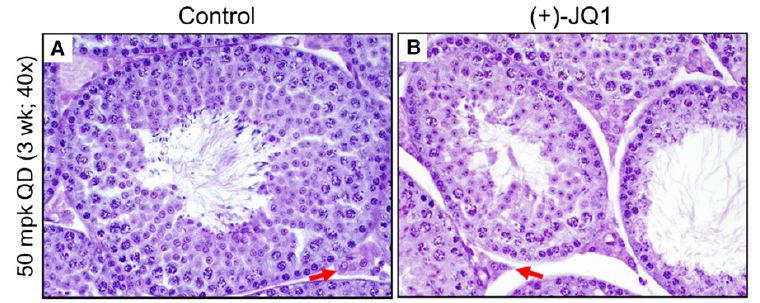Male birth control pill may be ready soon
September 7, 2012

Histological Analysis of the Antispermatogenic Effects of JQ1. Histology of stage VII seminiferous tubules of testes of 6-week-old mice treated with (A) vehicle control or (B) JQ1 (50 mg/kg QD) from 3–6 weeks of age (403 magnification). Red arrows indicate intertubular Leydig cell islands. (Credit: Martin M. Matzuk et al./Cell)
Attention men: The day may be coming soon when you can take your own birth control pill with no side effects, according to a study done by a group of scientists that includes a Texas A&M University researcher.
Working on mice, the team found that a compound called JQ1 acts as an inhibitor to sperm production and also sperm mobility.
“Both of these are needed for fertility, but JQ1 prevents both,” says Qinglei Li, an assistant professor in Texas A&M’s College of Veterinary Medicine & Biomedical Sciences, is part of a team of researchers led by Martin Matzuk at Baylor College of Medicine and James Bradner at Dana-Farber Cancer Institute who made the discovery..
“It stopped the sperm production very dramatically. More good news is that there appear to be no side effects whatsoever. Once the JQ1 was no longer given to the mice, they were back to their normal reproduction rates, and it did not affect mating behavior or the health of the offspring.”
Though the mice were given injections, the team believes that a pill could eventually be developed for the same results.
A male contraceptive pill has been talked about for decades, but so far none has been successfully created despite a strong demand.
While many men might be reluctant to take out the trash or ask for directions if they are lost, recent studies have shown that about 70 percent of men would be willing to take a birth control pill if it were available.
One drawback to many female contraceptives is that they sometimes interfere with hormones, especially estrogen. But Li says the team is confident that JQ1 does not affect testosterone levels in men, and appears to have no other side effects as well.
As with many discoveries, the JQ1 compound appears to have come about by accident.
It was originally used for anti-cancer treatments, but researchers found it was also an excellent compound in controlling fertility.
“This is an exciting step in male contraception,” Li adds.
“A compound with more specificity will be needed before clinical trials can be done for humans. It does not mean a male birth control just yet, but it is a great step forward in that direction.”